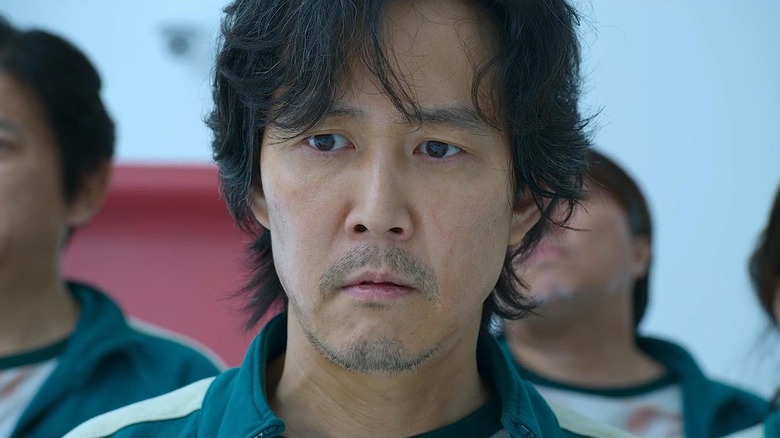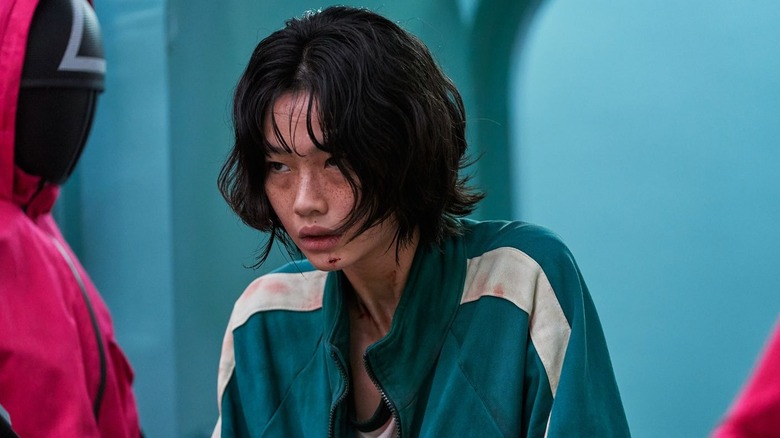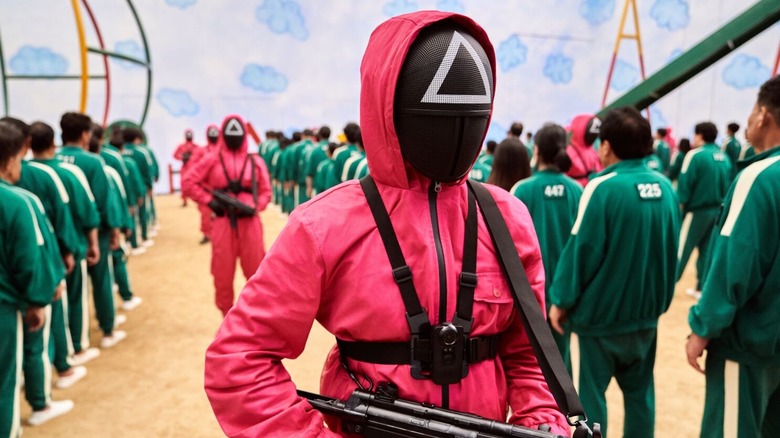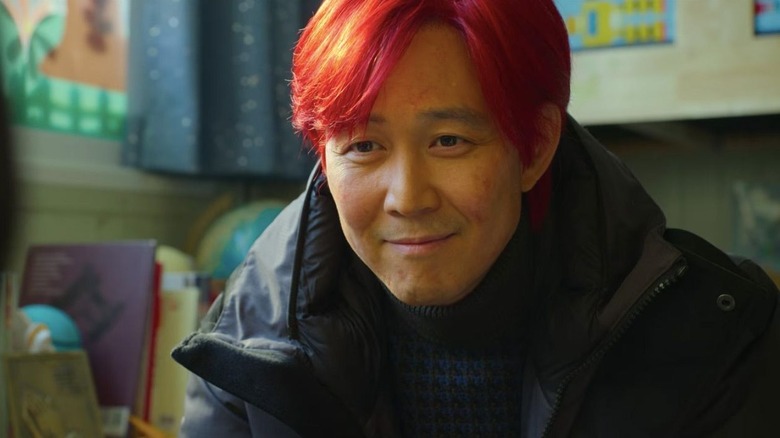Squid Game Made Netflix Almost $1 Billion – And Its Creator Got Almost Nothing
Even if you aren't a Netflix subscriber, chances are you're at least aware of the existence of the South Korean series, "Squid Game." Officially the most popular series in the streamer's history, Hwang Dong-hyuk's culture-shifting show about 456 individuals playing children's games to the death in the hopes winning will pull them out of financial ruin dominated water cooler conversations for much of 2021. The series was history-making, receiving 14 Primetime Emmy Award nominations and winning six, including star Lee Jung-jae taking home the statue for Outstanding Lead Actor in a Drama Series (the first time an Asian actor won the award for a non-English part).
The addictive survival thriller was produced by Netflix for about $2.4 million an episode, which is chump change compared to a series like "Stranger Things" (where season 4 cost a whopping $30 million per episode). But their investment paid off, as the Los Angeles Times estimates the show's success increased the company's value by about $900 million. With a promised second season, the questionable existence of a reality TV competition show spin-off, and tons of officially licensed merchandise, one could assume that Hwang Dong-hyuk would be able to swim in a vault of cash like Scrooge McDuck if he so desired.
Sadly, there is no golden piggy bank for the creative team behind "Squid Game," only the masked VIPs at Netflix who continue to profit off of their work. As the Los Angeles Times reported, part of Hwang's contract included forfeiture of all intellectual property rights and residuals. While some boot-licking jagoffs will undoubtedly side with Netflix under the guise of "smart plays" or whatever faux-financial advice their favorite mediocre podcast host is peddling that week, foregoing residuals or IP rights isn't the "cost of doing business," it's predatory behavior from an entertainment juggernaut.
This is (partially) why the WGA is striking
The Writers Guild of America is heading toward its second month of striking after the Alliance of Motion Picture and Television Producers (AMPTP) failed to negotiate a suitable deal. Unfortunately, due to arguably warped coverage motivated by studio interests and a general lack of knowledge of how greatly the industry has changed since the days before the streaming revolution, there are still an overwhelming amount of people that can't quite comprehend why the WGA is striking.
A document of the WGA proposals and AMPTP offers (or lack thereof) is available online, but one of the major battlegrounds for the WGA has to deal with residuals. One of the WGA demands has been to "establish a viewership-based residual — in addition to existing fixed residual — to reward programs with greater viewership." In layman's terms, the WGA is asking to be fairly compensated for streaming programming, especially when those shows blow up and become a cultural phenomenon. Not only would that require all streamers to release the transparent viewership numbers of their entire library, but it would also mean streamers could no longer make exorbitant profits off hit shows and movies without fairly compensating the creatives who made the project possible in the first place.
Once upon a time, a writer could work on a hit show or movie, and the residuals from syndication or replays would be enough to keep someone's bank account out of the red in between jobs. Now? We have folks like Alex O'Keefe, one of the writers of the smash-hit series, "The Bear" who accepted the WGA Award for Best Comedy Series with a negative bank account while wearing a bow tie purchased with a credit card, and Hwang Dong-hyuk.
An exploitation of labor
Films and TV series from South Korea have become a massive cash cow for Netflix, with series like "All Of Us Are Dead" and "Hellbound" exploding in popularity following the success of "Squid Game." Considering the writers' strike doesn't show any signs of ending anytime soon, there's a high probability that Netflix is going to double down on even more South Korean projects, as international productions aren't usually beholden to the rules of the WGA. But as the Los Angeles Times reported, these projects are often only possible by allegedly exploiting the South Korean entertainment labor force.
"It all comes down to labor costs," Kim Ki-young, president of the Broadcasting Staffs Union, which represents production crews, said. "There is a staggering amount of unpaid labor being done." The L.A. Times did reach out to Netflix for a comment and received the statement, "We pay fair, highly competitive rates with our K-Content creators and set clear standards for our Korean production partners, who produce all our shows and movies." The statement continued, "These standards meet or exceed Korean law." Translation: "It's pretty awesome that South Korea's labor laws are way more lax than the labor standards negotiated in Hollywood thanks to those selfish unions who won't work for scraps." For legal purposes, I am not an actual translator and that last sentence is a joke.
To emphasize the point, production crews on popular K-dramas produced by Netflix were paid a day rate ... but the time frame that constitutes a "day" in South Korea is wildly different than the 10-hour daily turnaround limit that dictates a "day" for IATSE workers in the States. South Korean productions define a day as "one unbroken stretch of filming," even if that means a film shoot extends beyond 24 hours.
Things have to change
This current model is unsustainable and unethical, and serious changes need to be made. According to The Hollywood Reporter, Netflix co-Chief Executive Ted Sarandos said this following a recent visit to South Korea, "It's important to us that we remain competitive and promote a healthy ecosystem, and in the case of a show's success, we make sure that creators are compensated in a right manner in the next season." This is a nice statement, but that certainly doesn't help anyone working on the first season — and given Netflix's penchant for canceling projects with reckless abandon, Sarandos' words offer little comfort.
If there's any silver lining to be found, it's that Netflix kept their word when it comes to Hwang Dong-hyuk, and all signs point to a lucrative deal for "Squid Game" season 2. However, as the L.A. Times pointed out, the filmmaker is also an outspoken advocate for a bill that would legally mandate residuals to film and TV creators. "I ask you to look beyond the short term and approach this as a step toward nurturing the entire ecosystem," Hwang said in a recorded video delivered to the National Assembly. "In order for there to be the next 'Squid Game' or the next 'Parasite,' the livelihoods of creators must be ensured."
And this isn't exclusive to international productions, either. Every day, striking WGA members share horror stories on social media about the ways studios utilize loopholes to deny equitable payment. For example, Ashley Lyle and Bart Nickerson, the creators of Showtime's "Yellowjackets" were paid a $40,000 production fee split between the two for 8 months of work developing the pilot. After commissions (agents, lawyers, etc.) and taxes were accounted for, their take-home total amounted to less than minimum wage.
The industry is at a crossroads, and unless the wealth hoarders at the top are held accountable, we'll all be forced to take the path of destruction.



